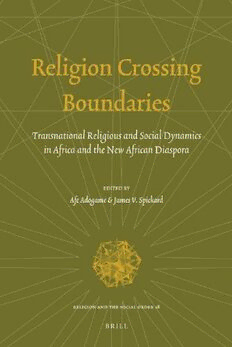
Religion Crossing Boundaries: Transnational Religious and Social Dynamics in Africa and the New African Diaspora PDF
292 Pages·2010·1.811 MB·English
Most books are stored in the elastic cloud where traffic is expensive. For this reason, we have a limit on daily download.
Preview Religion Crossing Boundaries: Transnational Religious and Social Dynamics in Africa and the New African Diaspora
Description:
Across the past twenty years major change has taken place in the structure of global society with respect to the nature of migration. The predominant pattern since at least the eighteenth century had been for peoples to move to and settle in Western countries permanently, with relatively little substantive interchange with their former homelands, hence adopting the modes of articulation characteristic of their new societies (a process expressed with respect to the USA, for example, as Americanization""). This pattern has now changed, and there is considerable interaction between homeland and migrant peoples. One of the places this has become especially important is in religious exchanges. While some negative effects of this process may grab headlines, there have also been extensive positive interactions, not least among African peoples, especially with respect to pentecostal and allied religious movements. The chapters in this book illustrate the variety of these exchanges.
See more
The list of books you might like
Most books are stored in the elastic cloud where traffic is expensive. For this reason, we have a limit on daily download.
